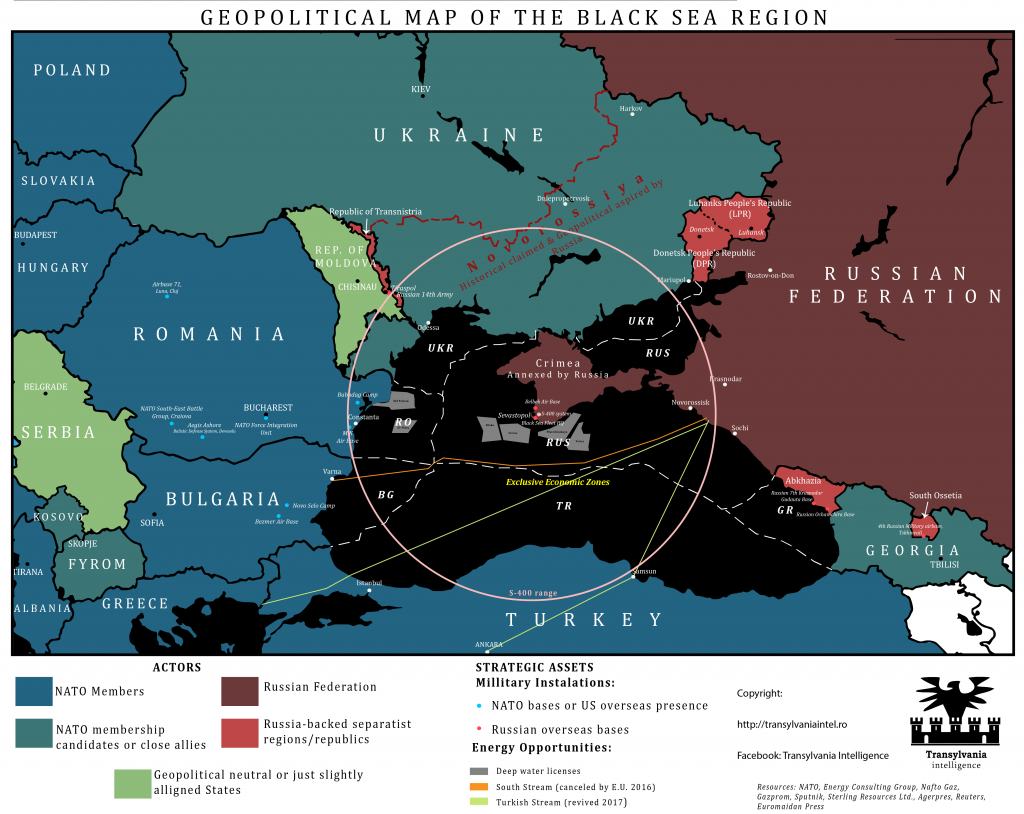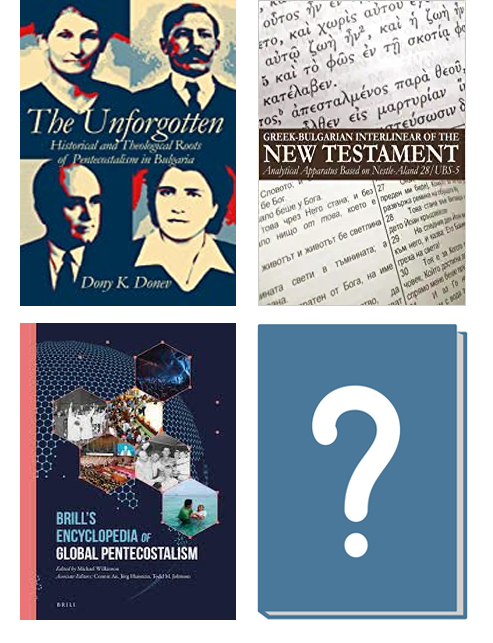Bulgaria once again on the verge of early elections
After the first successful vote of no confidence in Bulgarian history has become a reality, the county is now governed by a cabinet in resignation and a parliament torn apart by inter-party attacks. The National Assembly and the government can remain operational but attention must be paid to temporary majorities formed in plenary hall. However, adopting the budget update with its anti-inflation measures, which a large part of the Bulgarian population depends on, is in question, political analysts warn.
The vote is now over, but many questions remain unanswered.
“None of us who often commented on the objective difficulties, the contradictions in the coalition and the clash with the opposition could imagine that this government would be toppled so easily and so quickly,” sociologist Boryana Dimitrova, head of Alpha Research, said in an interview with BNR. “The economic stalemate, inflation and tense geopolitical state of affairs have led to a situation when no one is particularly eager to take power. Analysts have already pointed out that the lack of a political force that feels ready to take power prolongs the life of this government.”
After the cabinet was brought down, it turned out that solving the political puzzle is not so easy. The inability of the National Assembly to make decisions after the withdrawal of one of the coalition partners – “There is Such a People” is more than obvious and this will lead to early elections, analysts say.
Despite the difficult situation, Prime Minister Kiril Petkov said that “We Continue the Change” party, which is the largest political force in parliament, would accept the mandate of President Rumen Radev to form a government and would try to find 121 independent MPs. However, Deputy Prime Minister Assen Vassilev is pessimistic and forecasts that the country is heading towards new elections in the autumn.
“Seeking support from several MPs while it is unknown what mechanism can be used for them to join in and how sustainable their vote would be is either a tale for naive people or a dangerous political delusion,” Boryana Dimitrova says.
In this situation, the speed with which the parliamentary roulette will be turned is important. This depends on the Bulgarian President and there are constitutional deadlines, but the process can be faster or slower enough to update the budget – an extremely serious topic for many Bulgarians. The update envisages pension hike from 1 July, tax cuts for working families with children, support for the business to deal with high energy prices. Minister of Social Affairs Georgi Gyokov called on MPs to “show some common sense” and to support the social and anti-inflationary measures specified in the update.
“There is a lot of appetite towards the budget and discussions are heated,” sociologist Boryana Dimitrova says. “On the one hand we are told that various demands can be met, while others claim that this is a time bomb that would explode next year. It is difficult to find the truth, but in any case we need a serious conversation and a purposeful budget update. Whether this will happen and what proposals will be made between the first and second reading of the document in the National Assembly is an important political question that will give us signals whether we can think about future coalitions or overlap of opinions at least when it comes to basic economic principles.“
Government Elections in Bulgaria (2005-2022):
2005 Parliamentary Elections
2006 Presidential Elections
2007 Municipal Elections
2009 Parliamentary Elections
2009 European Parliament elections
2011 Presidential Elections
2011 Local Elections
2013 Early parliamentary elections
2014 Early Parliamentary Elections
2015 Municipal Elections
2016 Presidential election
2017 Parliamentary elections
2019 European Parliament election (23-26 May)
2019 Bulgarian local elections
2019 Municipal Elections
2021 March National Parliament election
2021 Second National Parliament election
2021 Third National Parliament and Presidential elections
The White House announces new US ambassador to Bulgaria
US President Joe Biden has nominated Kenneth Merten for new ambassador to Bulgaria in place of Herro Mustafa, who has been ambassador to Sofia since 2019. The nomination must be approved by the Senate in Washington. Kenneth Merten has acted as Special Coordinator for Haiti and he was also Ambassador to Croatia from 2012 to 2015 and Ambassador to Haiti from 2009 to 2012. Merton was also an economic adviser at the US Embassy in France. He speaks Haitian Creole, French, German and Spanish languages.
The East Syrian (Assyrian) Church
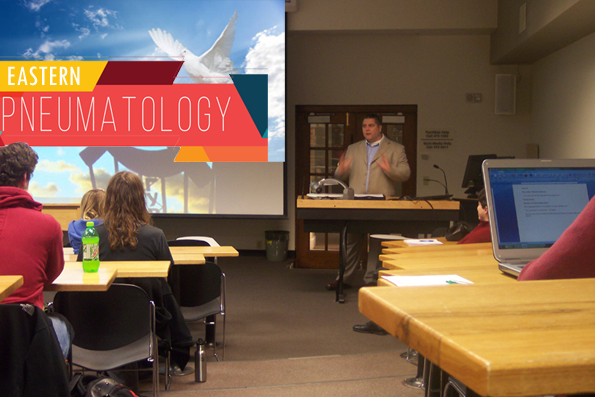
Dony K. Donev, D.Min.: Eastern Pneumotology Lectures
Eastern Orthodoxy can be expressed in one word: theism. The purpose and meaning of life is to become more like God. Deification is pursued by all means of human existence. This quest for divine likeness often includes the typical for the Eastern Church, speculation on the divinity and humanity of Christ, traditions on the doctrine of the Trinity and non-traditional mystical experiences. They appear in the context of both physical and spiritual characteristics in individual and corporate ecclesiastical environment. The role of the Spirit in the process of deification is threefold and involves: creation, re-creation and theism. Eastern Pneumotology follows the graduate process of theism development. The Spirit is involved in the original creation of the world as well as the new-birth experience. His work however, does not end there, but continues throughout the process of personal deification of the believer.
The East Syrian (Assyrian) Church
The Assyrian Church is viewed in direct connection with the Jacobites.[1] The church grows in the context of Nestorianism and Assyrian practices.[2] Yet, the literature of the Assyrian Church is full of pneumatologay including symbolic language and profound spirituality.[3] For example, Narsai’s (413-ca. 503) pneumatology is strictly in the boundaries of liturgical and sacramental practices. An immediate contrast, however, is Isaac of Nineveh (7th c.), who, during sacraments, would suddenly fall on the floor, repeatingly rising up and kissing the cross.[4]
For Narsai the Spirit sanctifies and edifies the church through baptism.[5] In a similar manner, Hazzaya (d. ca 690), another Assyrian writer, views the Holy Spirit not only as Edifier, but also as Perfector of the Church.[6] As such, He brings transformation in the life of the believer.[7] This state is reached with beyond the conscious prayer.[8] It is accompanied with sweet odors,[9] tears of joy[10] and sound of glorification heard in the soul of the individual.[11] This description fits the previously discussed experience of Symeon the New Theologian.[12] Isaac of Nineveh also describes the ecstasy in the Spirit in the means of tears of joy[13] and “a state of drunkenness.”[14]
The above is strictly a personal experience.[15] In a corporate, ecclesiastical context, the union of individual experiences builds the Kingdom of God. In this sense the Kingdom is an already-not-yet reality, in which the direction of the Holy Spirit is essential. [16]
The gifts are essential for the life of the Kingdom. According to Narsai, the they are received through laying on of hands.[17] Healing is obtained through a similar ritual.[18] Isaac claims that they are bestowed in a time of prayer.[19] They are accepted in humility out of which comes as burning compassion for the creation.[20]
Hazzaya, furthermore, gives five practical signs for recognition of the works of the Holy Spirit: (1) love of God burns within the heart of the believer, (2) growth in humility of the soul, (3) kindness to all people, (4) true love and (5) vision of mind. His main tool to recognize demons and demonic visions from God and divine revelations is the peace of heart, which follows the heavenly presence.[21]
Peace can be also reached through reading of Scripture. According to Isaac of Nineveh, Scripture delivers us from every evil thought and turns our minds to good.[22] Scripture is to be read not by chapters, but a passage at a time with prayerful desire for understanding.[23] This is one of the first recorded attempts explaining the connection between pneumatic experiences and Scripture.
[1] Burgess, 85.
[2] Ibid., 88.
[3] Ibid., 89.
[4] A. J. Wensinck, Mystical treatises of Isaac of Nineveh, trans. From the Bedjan Syrian text (Amsterdam: Koninklijke akademie van wetenschappen, 1923), 95-96.
[5] R. Hugh Connolly, The Liturgical Homiletics of Narsai, Studies and Texts 8 (Cambridge: University Press, 1909), 46, 49-50.
[6] Alphonsi Mingana, “Joseph Hazzaya: The Shortest Path that Leads us to God,” Early Christian Mystics, Woodbroke Studies 7 (Cambridge: W. Heffer and Sons, 1934), 148.
[7] Ibid.,149.
[8] Ibid., 171.
[9] Ibid., 148-49.
[10] Ibid., 183.
[11] Ibid., 183.
[12] Disc. 3329.5, 313.
[13] Wensinck, 330.
[14] Ibid., 253.
[15] Mingana, 157.
[16] Ibid.
[17] Connolly, 8, 21, 34, 40, 49, 53, 63.
[18] Ibid., 35, 44.
[19] Wensinck, xxxix, 116-17.
[20] Ibid., 388.
[21] Mingana, 173-74.
[22] E. Kadloukovsky and G. E. H. Palmer, Early Father from the Philokalia (London: Faber and Faber, 1954), 242.
[23] Wensink, 84.
Spiritual Fullness (Fullness in the Spirit) among Early Bulgarian Pentecostals and Today

Bulgaria’s early Pentecostals insisted on a spiritual fullness that included: (1) salvation, (2) water baptism and (3) baptism with the Spirit.[1] As a formula of spiritual experience, it satisfied the witness of blood, water and Spirit (1 Jn. 5:8) on earth; but also corresponded with the triune God in heaven (1 Jn. 5:7), from whom the believer’s spiritual experience originated. Many conservative Pentecostals in Bulgaria today still uphold “the fullness” teaching and would not use Bibles that exclude Johannine Comma (1 John 5:7) for these three “bear record in heaven.”[2]
However, even with the already present Trinitarian experience of the believer and the enormous theological Methodist influence, it is astounding that the doctrine of sanctification was not taught as a separate work of grace among Bulgarian Protestants. Even when after Pentecostalism spread in Bulgaria, it was not included in the tri-fold formula for “spiritual fullness” of the believer. During the persecution of the Communist Regime, speaking in tongues during Communion was done as a spiritual confirmation that the person has “fullness in the Spirit” or is not a government agent sent by the police to spy on the rest of the church. Interpretation often followed to confirm the spiritual stand of the believer. Early Bulgarian Pentecostals did not distinguish between the initial evidence and the gift of speaking in tongues. Even communist propaganda author Boncho Assenov, who categorized Pentecostals as a sectarian cult, defined this fullness as fundamental for the sacramental theology of the early charismatic communities in Bulgaria.[3]
[1] Mollov, 209.
[2] Zarev, 28.
[3] Boncho Asenov, Religiite i sektite v Bŭlgariia (Sofia: Partizdat, 1968), 167, 367.
See also:
The Practice of Corporate Holiness within the Communion Service of Bulgarian Pentecostals
Sanctification and Personal Holiness among Early Bulgarian Pentecostals
Water Baptism among early Bulgarian Pentecostals
First Pentecostal Missionaries to Bulgaria (1920)
The Orthodox Church before AD 1054

Dony K. Donev, D.Min.: Eastern Pneumotology Lectures
Eastern Orthodoxy can be expressed in one word: theism. The purpose and meaning of life is to become more like God. Deification is pursued by all means of human existence. This quest for divine likeness often includes the typical for the Eastern Church, speculation on the divinity and humanity of Christ, traditions on the doctrine of the Trinity and non-traditional mystical experiences. They appear in the context of both physical and spiritual characteristics in individual and corporate ecclesiastical environment. The role of the Spirit in the process of deification is threefold and involves: creation, re-creation and theism. Eastern Pneumotology follows the graduate process of theism development. The Spirit is involved in the original creation of the world as well as the new-birth experience. His work however, does not end there, but continues throughout the process of personal deification of the believer.
The Orthodox Church before AD 1054
The experiencing of the Spirit in this period is characterized with the existence of spiritual gifts, the quest for spiritual knowledge and an experiencing of the kingdom of God. Beside attempts to explain the nature and existence of the Trinity, the ecclesiastical writings contain passages on sin and prayer (John Cassian), creation and re-creation (Maximus the Confessor). The main focus in this context remains on the mystical experiencing of the Spirit. A motto statement of this era is the expression of Pseudo-Dionysius the Areopagate that “God can be approached experientially beyond the bounds of sense perception and reason.”[1]
From a similar perspective John Cassian believed that spiritual knowledge comes only through the presence of the Holy Spirit.[2] It is a result of one’s inflammation with the desire to possess the wisdom of God. This search for spiritual knowledge is accompanied by a personal quest for ethical and practical knowledge. The process contains one’s deliverance from the evil of the world and humility of heart as the fruit of the Spirit.[3]
The fruit of the Spirit is the context in which the gifts of the Spirit operate. They are not a product of one’s efforts, but rather acts of God’s grace. Cassian divides the list of existing spiritual gifts in three categories: (1) gifts of healing, (2) gifts for ecclesiastical edification and (3) gifts contrived by deceiving devils.[4] The latter probably resembles a problem with false teachers and false prophets experienced within the Eastern Church of the late third and early fourth centuries.
Cassian further claims that the spiritual gifts are given for a season, after which only love continues.[5] Yet, on the other hand, he reports the experiencing and practice of spiritual gifts in his time.[6] It seems appropriate to assume that Cassian did believe in the operation of spiritual gifts not only through the apostolic time, but also in his own time. Thus, his postulation for the disappearance of the Spiritual gifts refers to a rather latter period when the church will not be present in the world any longer and spiritual gifts will not be needed in the context of the Kingdom of God. Love, however, will remain.
Another writer who focuses on the nature and the existence of the Kingdom of God is Maximus the Confessor (ca.580-662). Maximus was born and lived in the aristocratic circles of Constantinople, the capital of the Byzantine Empire. He was exiled in Thrace for opposing the heresies of monotheletism and monoenergism.[7]
In the pneumotological context of his claims, he assumed that the kingdom of God is the Holy Spirit. He proves the former by an interesting analogy between the kingdom, where God dwells, and the temple of the Spirit, which are the Christians. The spiritual temple is consisted only of the believers who have rejected evil and thus have accepted the fruit and the gifts of the Spirit.[8] Since they have the kingdom of God inside of them, Maximus concludes that the Spirit and the Kingdom are identical equivalents.
The Kingdom of God, according to Maximus, is realized only in a state of continues prayer. It is only then, that the mind departs from all human knowledge and worldly ideas. Separated from all human perceptions, one receives understanding of God, but “only without the human senses.”[9] This state is an ecstasy in which one abides in God in a complete, but rather momentary deification.[10] The eternal deification is preserved for the ones who maintain a righteous life, and is reached only in the eternal union with the Trinity.[11]
The process and act of deification is described as the Baptism of the Holy Spirit by another systematic writer of this early period, by the name of Symeon the New Theologian. Burgess describes Symeon as the most mystical writer in description of his personal pneumatic experience.[12] The New Theologian, claims that baptism of the Spirit opens the door for a continuous theosis. Thus, deification is impossible apart from the spiritual baptism.[13] Denial of the fact that the Spirit baptism and deification cannot be experienced today is blasphemy or unforgivable sin.[14] In this context, one can be neither saved, nor deified without the baptism of the Spirit.
Furthermore, the baptism of the Spirit is received only after extensive process of preparation and purification, which comes close to our modern-day, Pentecostal understanding of sanctification. During this process, one grows in meekness and humility, being aware of his/her sins.[15] The final stage involves purification with many tears, without which no one can receive the Holy Spirit.[16] Symeon understands the above process of the baptism with the Holy Spirit as a return to a radical living of the Gospel in analogue to the primitivism of the first century Church.[17]
[1] Burgess, 38.
[2] Conf. 14.16, NPF 2nd Series 11:444.
[3] Colm Luibhead, John Cassian: Confences, CWS (New York: Paulist Press, 1985), 14.10, NPF 2nd Series 11:440.
[4] Conf. 15.1, NPF 2nd Series 11:445-46.
[5] Conf. 1.11, NPF 2nd Series 11:299-300.
[6] Conf. 15.4-5, NPF 2nd Series 11:447.
[7] Burgess, 40.
[8] Ibid., 44.
[9] Ambigua 10, PG 90:col. 1113.
[10] Ambigua 7, PG 90:col. 1076.
[11] Ambigua 10, PG 90:col. 1196.
[12] Burgess, 38.
[13] Ibid., 61.
[14] Disc. 33.3-5, 341-43.
[15] TGP 3.23, 87.
[16] Disc. 3329.5, 313.
[17] Burgess, 62.
160,000 Pentecostals in Bulgaria Reported by the NEW Encyclopedia of Global Pentecostalism
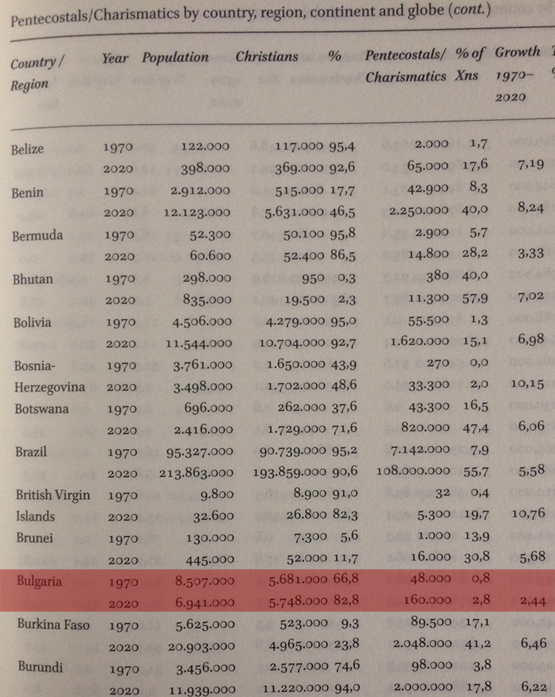
How many people die in the Great Tribulation?
We start with roughly 8 billion population
Revelation 6:8 KJV “And I looked, and behold a pale horse. And power was given unto them over the fourth part of the earth, to kill with sword, and with hunger, and with death, and with the beasts of the earth.”
8 bil : 4 = 2 billion dead
6 billion left alive after Rev. 6
Rev. 9:15-18 another 1/3 of the world’s population will be dead
6 bil : 3 = 2 billion dead
4 billion left alive after Rev. 9
4 bil out of the original 8 bil is 50%
The odds that anyone would survive the Great Tribulation are 50:50 or even less…

RUSSIA/UKRAINE WAR: ENTER the BIRTH PANGS

Takeaways from our recent message series on Last Minutes of the Last Days: Last Things before the Rapture
Jesus pointed out that in the last days just before his imminent return there shall be terrible times characterized by wars, rumors of wars, famines, pestilences, earthquakes, these are the beginning of more sorrows to come. We’re all witnessing these things NOW in our generation.
The last minutes of the last days are unfolding before our eyes. After two years of pro-pandemic thinking, just in the past few weeks we’ve been introduced with a series of Eschatological Milestones.
WAR on UKRAINE (Pointing toward Israel): ENTER the BIRTH PANGS
WAR
Nuclear instability not at one, not at two, but at three major nuclear plants in Ukraine
https://www.npr.org/2022/03/11/1085427380/ukraine-nuclear-power-plant-zaporizhzhia
U.S. President Biden visiting Eastern Europe only days after Kamala Harris visited there.
Belarus to get involved https://www.reuters.com/world/ukraine-says-russian-aircraft-fired-belarus-ukrainian-air-space-2022-03-11/
Iran attacks American consulate in Iraq AGAIN https://abcnews.go.com/International/wireStory/missiles-target-us-consulate-north-iraq-casualties-83412862
China warns of ‘worst consequences’ for any country that supports Taiwan militarily
https://www.foxnews.com/world/china-worst-consequences-taiwan-military-support-warning

NATURE
Turkey is ready to flood a second channel from the Black Sea to the Mediterranean. Dries up the Euphrates and Tiger rivers (as in Revelation) https://www.youtube.com/watch?v=RxrgKfRIdW0
Earthquakes in Utah (of ALL places in the world)
ECONOMY

Digital Dollar as last stop before setting the financial system of the Apocalypse
https://www.cnn.com/2022/03/11/tech/us-digital-dollar-cbdc/index.html
Saudi Arabia Considers Accepting Yuan Instead of Dollars for Chinese Oil Sales
BULGARIA
Bulgarian Army now drafting while the Bulgarian government suddenly re-examines our network of bomb shelters long forgotten from the days of the Cold War.
US defense chief’s visit to Bulgaria ‘extremely significant’
Bulgarian ex-Prime Minister and Cabinet members in police custody https://www.novinite.com/articles/214334/Bulgarian+Former+PM+Boyko+Borissov+Spent+the+Night+in+Police+Custody?fbclid=IwAR2Pu1cHhQDhThna3Ye0vajQMHiouZ2v7bx6r7za-5CAgpGkVGZIn6c7Cnk
Brink of NUCLEAR war: Ex-RAF chief warns the world could be only ‘a few steps’ from atomic weapons being used as increasingly desperate Putin struggles to win his war in Ukraine
- Air Marshal Edward Stringer says nuclear war is ‘no longer unthinkable’
- He claims atomic weapons ‘could’ be used as Russia’s invasion continues
- EX-RAF Assistant Chief of Air Staff says it could be ‘only a few steps away’
Need more be said that the time to prepare for Christ’s imminent return is NOW?
“NOW learn a parable of the fig tree: (Israel re-birthed as a nation May 14, 1948) When his branch is yet tender, and puts forth leaves, ye know that summer is nigh: So likewise ye, when ye shall see all these things, know that it is near, even at the doors. Verily I say unto you, THIS GENERATION shall not pass, till ALL these things be fulfilled.” Matt 24:32-34
- It’s been 6,000 years, or 120 jubilees, since the Biblical creation (Gen. 6:3; 2 Pet. 3:8).
- It’s been 70-plus years, the span of a Biblical generation, since the “fig tree,” the Nation of Israel was reestablished and began putting forth leaves (Matt. 24:32-34; Ps. 90:10).
- The stage is set for the global Ezekiel 38 war-conflict, the emergence of the 10-nation beast as a governing system, and the global economic collapse told by John in the Revelation (Rev. 6:6; 13:7; 17:12-14).
- Multiple peace deals between Israel and its Arab-Muslim neighbors are on the table or in the works (1 Thess. 5:3).
ALL that remains to happen before the Church is SUDDENLY COUGHT AWAY is the sound of the TRUMP of GOD (not angelic trumpet, not the 6th or the 7th trumpet but the last trumpet, which belongs only to GOD)
When that awesome trumpet sounds, there will be only TWO KINDS OF PEOPLE on earth: those ESCAPING judgment and those being LEFT BEHIND to face it. (Luke 21:34-36). The stage is set. The foreshadows (signs) of Daniel’s 70th Week are too evident to ignore; the final 7 years can’t begin as long as the Church is still on this earth as the Restrainer (2 Thess.2:6)
“For God hath NOT APPOINTED US TO WRATH, but to obtain salvation by our Lord Jesus Christ.” 1Thessalonians 5:9
To be part of the escaping group, one must be saved and in a real relationship with Jesus. If you’re unsure where you stand with God, call on Him now, confess Him as Your Lord and Savior and turn away from sin. Time is running out…

The Road Ahead
Bulgaria in the Tension between NATO, Ukraine and Russia
Bulgaria‘s strategy in the crisis over Ukraine, adopted at today’s cabinet meeting, will be aimed entirely at the Bulgarian army, and our country will make every effort to resolve the conflict peacefully. This was announced by Prime Minister Kiril Petkov after the government session.
Some of the information during today’s sitting is secret and will not be announced, including to the deputies in the parliament, Kiril Petkov told the ministers. Later, it became clear from his words to the media that Bulgaria will focus all its efforts on resolving the Russia-Ukraine conflict through diplomatic channels. And our defense system will be aimed at developing the potential of the Bulgarian army.
Less than a day was the deadline given by Prime Minister Kiril Petkov to the Minister of Defense Stefan Yanev to prepare a draft of the national position of our country and measures to strengthen the security system in Bulgaria. The project was submitted and approved at today’s meeting.
The Council of Ministers decided to prioritize Bulgaria‘s strategy towards fully de-escalating tensions between NATO and the Russian Federation, as well as to use absolutely all opportunities through diplomatic channels to resolve this conflict. Our defense strategy will be based on the Bulgarian army. That means Bulgarian troops, Bulgarian command and Bulgarian military leadership, said Kiril Petkov, prime minister.
The Prime Minister expressed regret that over the years our army has been underfunded and stressed that we will work actively to cover precisely these deficits by avoiding the purchase of equipment that is not systematically selected. From now on, Bulgaria should not be just a consumer of security. It should be a constructive partner of NATO, said Kiril Petkov.
The Minister of Defense Stefan Yanev announced that together with the diplomatic efforts “Bulgaria must develop its defense potential in the direction of preparing a battalion battle group with Bulgarian troops and Bulgarian command”. On BNT he explained the details:
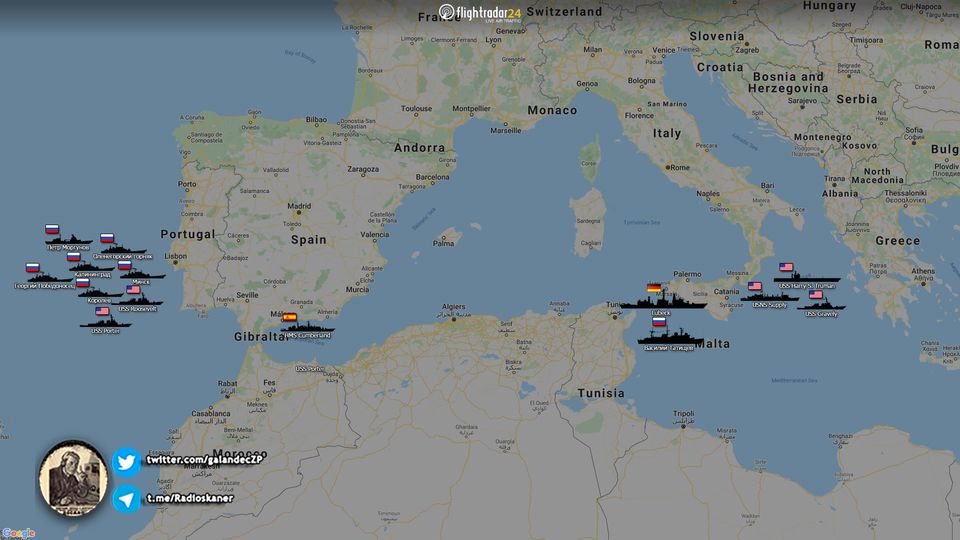 This will happen with a limited contingent, if we talk about what size – the order is not more than one battalion, not more than 1,000 people. A joint exercise is not a task, but a means, a joint exercise is a means to increase training and capacity. The battalion will take part in joint NATO exercises, which have been planned since last year, Yanev said. According to him, the decisions made today will be the Bulgarian position in the framework of the discussed measures in NATO.
This will happen with a limited contingent, if we talk about what size – the order is not more than one battalion, not more than 1,000 people. A joint exercise is not a task, but a means, a joint exercise is a means to increase training and capacity. The battalion will take part in joint NATO exercises, which have been planned since last year, Yanev said. According to him, the decisions made today will be the Bulgarian position in the framework of the discussed measures in NATO.
Neither the Prime Minister nor the Minister of Defense commented today on the information from the last days about the possible deployment of NATO ground troops and fighters in our country.
Source from Brussels: Bulgaria is Ready to Accept French Soldiers
And the Foreign Minister reminded that since December at all diplomatic forums our country has consistently insisted on the need to find a diplomatic solution to the conflict. These efforts will continue in the future. We hope that the conflict will be resolved diplomatically. However, diplomatic speech must be supported by the necessary evidence that we have the necessary defense capabilities, said Teodora Genchovska – Minister of Foreign Affairs.
The National Assembly heard out Kiril Petkov and ministers on Russia-NATO tensions at an extraordinary meeting today
The Prime Minister, the Ministers of Defense, the Ministers of Foreign Affairs, and the heads of the services in connection with the Russia-NATO tension and the Bulgarian position were heard in the parliament.
Bulgaria is not a consumer of security – this was stated by Prime Minister Kiril Petkov before the National Assembly. He added that in the current situation the Bulgarian army will be prioritized with a battalion, which will probably be formed in April-May. There is also a readiness to withdraw Bulgarian diplomats from Ukraine, but there is no such need at the moment.
The Minister of Defense highlighted the deficits in the Bulgarian army. The Foreign Minister pointed out that our country gives precedence to diplomacy.
MPs outlined dialogue as the best mechanism for resolving the crisis. They expressed concern about the state of the Bulgarian army and the possible economic consequences of escalating tensions.
The de-escalation of tensions is a top priority for Bulgaria, Prime Minister Kiril Petkov reaffirmed before parliament.
Bulgarian PM: Bulgaria is a Sovereign State. Russia should De-Escalate
“The escalation is real. We monitor all developments in this conflict on a daily basis. Our strategy for the first time has the idea of not being security consumers, but partners. Over the years, there are clear deficits in equipment in the Bulgarian army. We have different options – to prioritize the Bulgarian army, with Bulgarian troops, with Bulgarian command,” said Kiril Petkov.
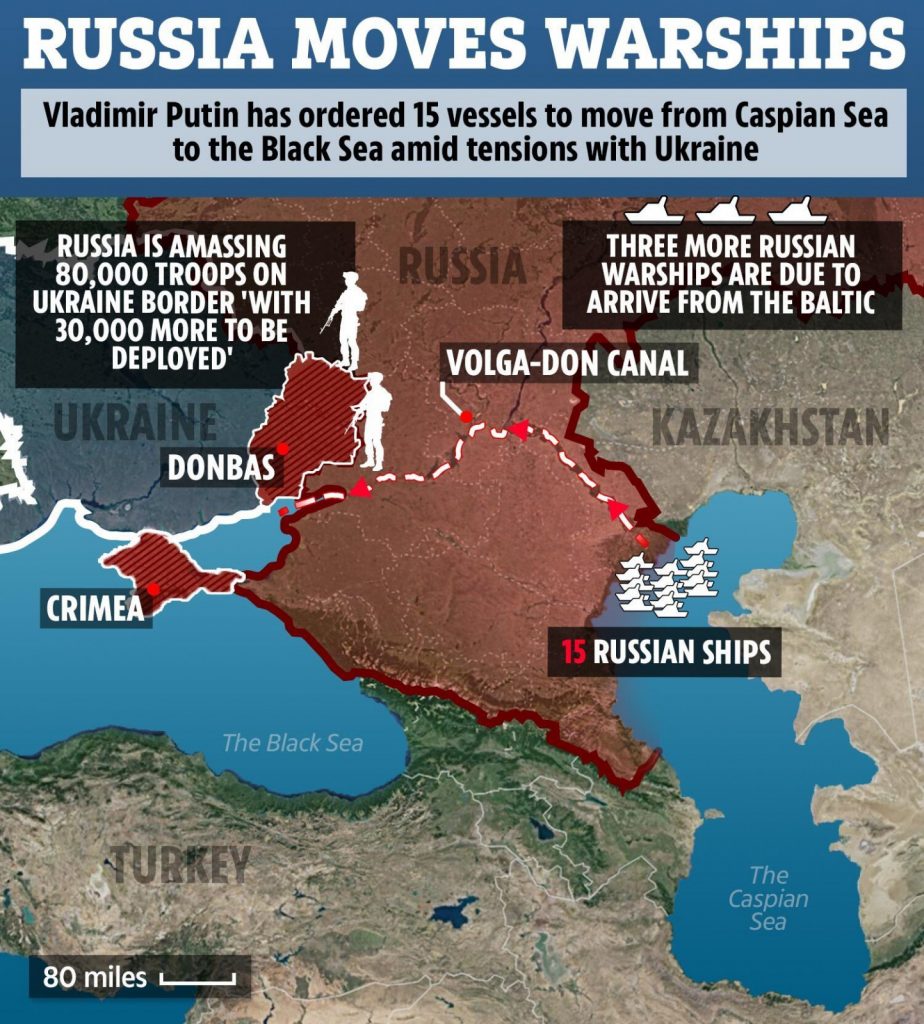
The Minister of Defense further developed the idea of prioritizing the Bulgarian army.
“A Bulgarian battalion will be made and everything will be done through national communication channels. This means that this battalion will increase the pace of preparation. We do not envisage escalation. We do not envisage plans to defend national territory. Nor do we envisage plans for another team to go elsewhere, to a different place”, said Stefan Yanev – Minister of Defense.
The Foreign Minister pointed out that our country gives precedence to diplomacy.
“Obviously, Russia is trying to divide allies by dividing them into categories,” said Teodora Genchovska, the foreign minister.
Opposition party GERB expressed concern that our country may behave as a security consumer.
“We will support you if you stop raising dust with phrases such as ‘national interest’. For us, the national interest is to be a strong member of NATO. GERB governments have done a lot for our defense capabilities – we paid for ‘Cougars’ and ‘Spartans’, you will order and pay the next F-16s. If you offer us a meaningful position – we are ready to support you,” said Daniel Mitov of GERB-SDS.
“The only thing to say whether we are a consumer is how we set our priorities. Our priority is the Bulgarian army with Bulgarian troops,” said Kiril Petkov.
The political party Democratic Bulgaria expressed concern over the state of the Bulgarian army.
“The mission of the Bulgarian army is constitutionally set, but we are all aware of the degree of readiness of obsolete equipment and delayed modernization,” said Hristo Ivanov.
The opposition party Movement for Rights and Freedoms outlined the best solution to the problems in this crisis.
“Through discussion, transparency, and everything that leads to military action. What would be the economic consequences?” Mustafa Karadayi said.
“The main risks are in the energy sector,” Kiril Petkov replied.
And the coalition party “There Is Such a People” focused on the possible economic consequences of escalating tensions.
“Is there a scenario for the energy sector?” Victoria Vasileva of TISP asked.
“We have a clear plan and we are in communication with the EU on how this can happen. Bulgarian households and businesses will be able to count on it,” said Kiril Petkov.
The Bulgarian left welcomed the ruling party’s decision to de-escalate tensions.
“The key for Bulgaria is to maintain its position in this hysterical situation. Bulgaria will not engage in hostile and military action,” Christian Vigenin from the Bulgarian Socialist Party said.
The nationalist Vazrazhdane (Revival) party asked the prime minister if he thought Russia posed a threat to Bulgaria‘s national security.
“There is an escalation of hysteria in Bulgaria. Russian troops are just doing standard exercises. This is being used in the domestic political debate. We are not just a consumer of security, we are using security as a maneuvering ground,” party leader Kostadin Kostadinov said.
Russia has launched Military Maneuvers near Ukraine and in Annexed Crimea
Bulgarian PM: Bulgaria’s Sovereignty is Above Everything
“We have no master. No one can say otherwise,” said Kiril Petkov.
